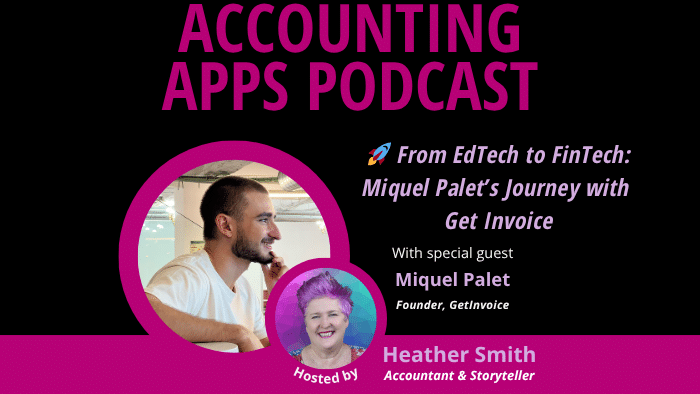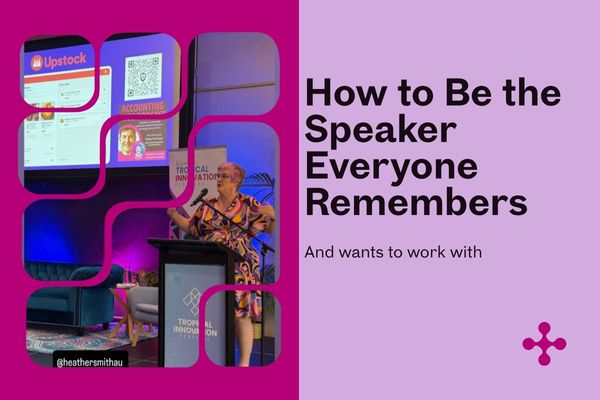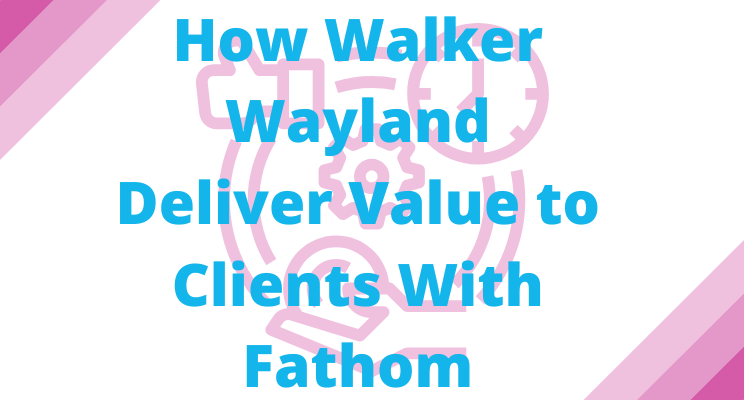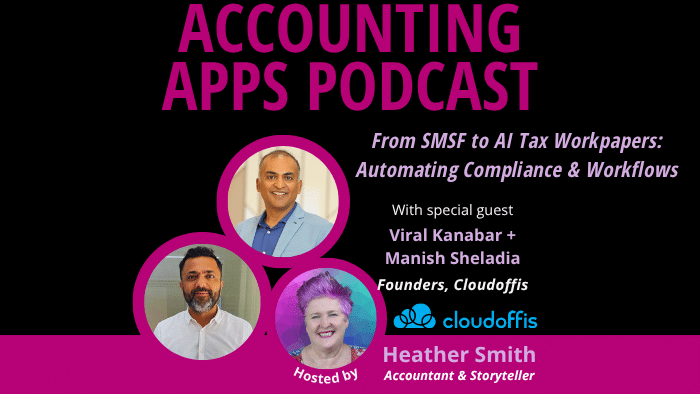“Who I am online is exactly who I am in person. I guess that could be a decision point. Decide who you’re going to be. I would say be you. It’s worked for me.”
Catherine Walker Community Manager, Xero
Today I’m speaking with Catherine Walker Community Manager at Xero
In this episode, we talk about . . .
- How writing a thesis on the viability of organising information on the internet as part of her Master of Library and Information Studies was a solid foundation for her Community Managers role.
- As one of Xero’s earliest employees, realising people were deciding whether to buy Xero over social media and jumping in to respond
- What the day to day role of a community manager looks like
- Advice for accountants and bookkeepers interacting on social media
- Inspirational and funny stories of people Catherine’s met thru the community
- Diffusing situations and dealing with negative energy on social media
Catherine, what’s one New York food item that we need to know about that we probably don’t already know about?
Catherine: Wow, that’s a hard one because I tend to cook a lot of stuff at home, and so I make all of the things that I like to eat in New Zealand. I don’t eat them myself, but I think giant pastrami sandwiches are probably a pretty quintessential New York thing.
Heather: Absolutely. Thank you for that. I’m sure, yeah, I think they do the pastrami on rye. Again, I don’t even think I’ve ever eaten pastrami meat, but they talk about the pastrami on rye and the giant pastrami sandwiches. So thank you for that. It’s always interesting to go out and try something new when you’re visiting a new city. But yes, you are an amazing chef as well. I do know that.
Can you share with our listeners a bit about your background?
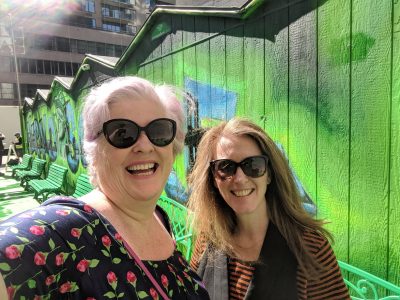 Catherine: Sure. So as you’ve already alluded to, I did grow up in New Zealand, so small-town New Zealand, and I started my adult life out with a music degree. Now, I play around on social media all day, and I guess the listeners can’t see me do air quotes around “play.” I probably don’t even need to say play on social media anymore because I think we realise it’s a real job these days. So I did the living in England, travelling in Europe thing, worked as a PA. I returned to New Zealand and did a Master of Library and information studies. One of the courses in that programme in 1995 was an introduction to the World Wide Web, and I was hooked.
Catherine: Sure. So as you’ve already alluded to, I did grow up in New Zealand, so small-town New Zealand, and I started my adult life out with a music degree. Now, I play around on social media all day, and I guess the listeners can’t see me do air quotes around “play.” I probably don’t even need to say play on social media anymore because I think we realise it’s a real job these days. So I did the living in England, travelling in Europe thing, worked as a PA. I returned to New Zealand and did a Master of Library and information studies. One of the courses in that programme in 1995 was an introduction to the World Wide Web, and I was hooked.
Catherine: So after writing a thesis on the viability of organising information on the internet … I mean, huh? I got a job coding in project managing changes that we needed for websites as the web made its way into big business and became mainstream. I moved around different companies doing that sort of work and helping people build intranets and things like that. That’s where I came across Rod Drury because I was helping a company implement an intranet that he’d sold them. Our paths crossed a few times after that. When he founded Xero, he asked me if I’d like to join. Of course, I wanted to, but my skillset back then was taking a piece of software and writing about why and how you would use it, and of course, there was no software from day one. There wasn’t even the name Xero day one. I didn’t join as the first official employee until about six months in, and that’s when the predecessor to Xero Central, which I’m sure many of your listeners will know about, was born. That’s what I did for about three years until Twitter came along and our marketing team got some social media accounts and realised that no offence to our marketing team, but a lot of product questions and discovery work when people were trying to decide whether or not to buy Xero, they were all coming onto social media and I was in a good place to be able to answer all those questions. I took over the social media aspects of Xero back then, and 11 years later, still doing it.
Heather: Excellent. That’s so many things I didn’t know about you. I didn’t know that you’d done a library and information qualification, and that actually makes so much sense, in that through the social media, you’re providing so many resources which in effect, is what a librarian frequently does. Even if we reference an old school librarian, they’re able to go and find resources for people when people need something which is very much what you do.
Catherine: Yeah. It was really interesting doing that course, because I hadn’t worked in a library before, and that’s not why I did it. I did it because I was really interested in how you could organise and spread information in the digital world. But there were certain library management courses, and I remember one of the things that stuck with me was they said, “As a librarian, you should never be so threatening as to just say to somebody, ‘Did you look in the catalogue?'” Because it makes that person feel really dumb if they wanted to help themselves. Even now, I’m very cognisant of not just saying to somebody, “Well, you should have been able to look that up yourself.”
Heather: Yeah, absolutely. No, I totally hear that. I kind of feel the same way in terms of I don’t … Well, I’m in a different situation, but I don’t necessarily want to give the person the whole answer. What I want to do is give them the structure to find the answer or point them in the direction of finding the answer, so they have more education around that next time they come across it. Because very much so, and I’ve actually got a number of friends who are librarians, and a lot of their time is educating people about that sort of structural process of finding the answer. That’s really interesting, and actually for people who are in the community building area, and community management area, that might actually be an interesting course for them to delve into.
What is your role today, and what does a typical day look like for you?
 Catherine: Wow. So, my role today is pretty much the same as when I officially started in this role. Although, having said that, the company and the team and the strategy, all of the changes that have happened to Xero over the years, I feel like I’m only doing a slither of what I once did. I guess at the core of it, my day-to-day is reading through the comments and questions posted about Xero across the main social networks. For us, that’s Twitter, Facebook, LinkedIn, and Instagram is growing.
Catherine: Wow. So, my role today is pretty much the same as when I officially started in this role. Although, having said that, the company and the team and the strategy, all of the changes that have happened to Xero over the years, I feel like I’m only doing a slither of what I once did. I guess at the core of it, my day-to-day is reading through the comments and questions posted about Xero across the main social networks. For us, that’s Twitter, Facebook, LinkedIn, and Instagram is growing.
Catherine: And then the online community in general, so that’s things like Reddit, review sites, forums, and just I guess anywhere else online that Xero might pop up. I’m either responding to people, they’re not always customers, on the spot, or investigating what the answer might be if it’s outside of my area of expertise. Or, I’m just making connections with our support team and other staff. I mean, it’s not really playing around on social media when you think that that takes all day, and sometimes into the night. Sometimes the work surrounding getting one answer to a customer or a person on social media. Sometimes the time taken could be 20 seconds.
Catherine: Sometimes it could be hours if I need to recreate the issue that a customer’s reporting or going back and forward with them, or finding out if we have the right information to give them, or requesting an update, working with customer support. If someone says there’s a big, I need to figure out is it a big, is it not, is it a different process? And there’s no longer just one or two people at Xero who know everything. Actually, a lot of the time behind the scenes is trying to figure out where those people are.
Catherine: And also long gone are the days where when I can’t just go into the help centre and update something anymore, or affect the direction that the product is going to take, but all I can do is be a customer advocate inside. That does take quite a while. I mean, the amount of time I spend on Slack, trying to find the right information and the right person to help, you think that I would be a master Slacker by now, but alas I’m not.
Catherine: When I’m not doing that sort of helpful outward-facing type of stuff, if there’s any time left in my day or week, I do other things like helping make new staff feel welcome, keeping up with the happenings around the business. I am the person that enters the data into our demo company, so anybody out there who’s used the demo company, I put all the data in there. I’m always being asked to impart little bits of history, whether that’s photos out of the archives, I spend time playing with our product of course, so I know what it does. I knit sweaters and jerseys and caps for babies that are born of our Xero staff. I just do a lot of immeasurable, enjoyable stuff behind the scenes, as well.
Heather: Absolutely. You’re very much the core of what gives Xero the heart from the very start of times, and you’ve always been a really important person in the Xero community for us to turn to. It was interesting hearing you talk about the mediums that you are working on. So, some of them which I would have of course think of, Twitter, Facebook, LinkedIn, but interesting that you’re highlighting that Instagram is growing, because it’s an unusual platform, Instagram. There’s a lot of weird and wacky stuff there, but it’s interesting.
Xero does have a presence on Instagram, are people are asking business questions that you need to follow-up with on there?
Catherine: They are, yeah. I don’t have a lot to do with the team that’s posting stories and pictures and snippets on there, but if somebody’s struggling with a product, I think if Xero pops up in front of them and they think, “Oh, that’s right. I needed to ask that.” They’ll just ask right there on the platform. There’s not a lot, but there’s some.
Heather: Yeah. No, it is interesting. I know that I’ve had people reach out to me to become clients on Instagram, and I find it quite bizarre that they would send me … Some of them are sending me three paragraphs worth of messages about their business et cetera. I’m like, to me, I’m an older person, this isn’t normal. You would send this to me on an email, or you would come through my website. You’ve sent this to me on Instagram, this is very bizarre. But the other site that you did mention there is Reddit. Reddit is one of my favourite sites on the internet. I probably go there and look at it every day. Not necessarily for business reasons, but I have definitely noticed too, in there, and providing resources and supports there. Another one for community people to consider.
What is something that people should keep in mind when they are responding on social media? Noting that the listeners today will be from the accounting and bookkeeping community and also many of them will be actually working within accounting apps, what’s something that they should keep in mind when responding on social media?
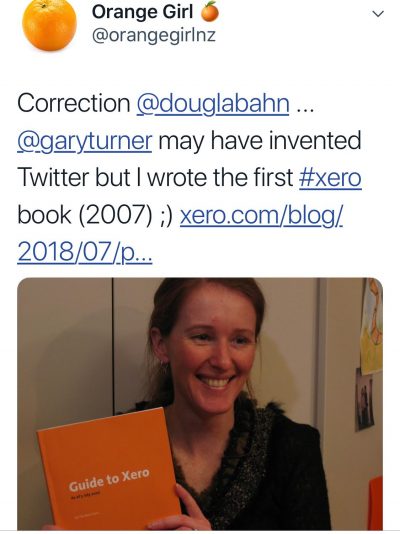 Catherine: For me, things that I keep in mind from a business sense, I think I do most of them on autopilot. For me, there’s no cussing, no typos, no broken links. I don’t say anything I’m not sure about. I make sure that I can back up whatever I say. Responding with consistency is a really big one for a business because we’ve got multiple people responding and also I have to make sure that I’m saying what’s been said before. Using a tone and style that’s based on Xero’s, our own tone and style, but also the person that you’re messaging with, you need to often match theirs.
Catherine: For me, things that I keep in mind from a business sense, I think I do most of them on autopilot. For me, there’s no cussing, no typos, no broken links. I don’t say anything I’m not sure about. I make sure that I can back up whatever I say. Responding with consistency is a really big one for a business because we’ve got multiple people responding and also I have to make sure that I’m saying what’s been said before. Using a tone and style that’s based on Xero’s, our own tone and style, but also the person that you’re messaging with, you need to often match theirs.
Catherine: It wasn’t always as easy to just do these things without thinking. I’ve trained people along the way and I can see the nervousness when you do your very first post out of a company account, and the first time you come across something tricky, but it’s definitely become ingrained these days.
Heather: Just developing and creating a tone and style ethos or manual actually must be so difficult. Once you go from one person, to have the next person emulate it, but also what was interesting there, it’s like you said, we have to speak with the Xero tone and style, but we actually have to match their tone and style at the same place, in the same instance, which I totally get that you’re doing.
Heather: But I think that that must be such a difficult thing to educate people on. I think some people get it, and some people don’t, and I don’t know how you get the person who doesn’t get it to a point where they get it.
Catherine: Yeah. I mean, you’re right. It’s a process of learning and I know … I mean, most of the people who I’ve trained seem to take it quite well, but I am a bit of a control freak, and it does take a wee while for me to let them go, but I think they appreciate doing … We’ll get on a call together and they will answer things in real time, with me looking over their shoulder. It must be terribly daunting for them, but I think it’s just the way to figure out, and just pick up all the little things, that if somebody doesn’t use contracted words, or they’re very dear sir/madam when they talk to us, that we should probably be the same back.
Catherine: And also because we’ve got a global audience, sometimes you can figure out fairly well that somebody’s … English is not their first language, so you have to be not too colloquial when you respond, because the meaning might get lost.
Heather: Yeah, absolutely. It’s the contracted words is an interesting one, and I know that when I wrote Xero For Dummies, their style was they wanted contracted words, and I was always brought up, and everyone’s going to think, “Oh, my God, she’s such a snob,” but my family motto also was, “Our family does not use contracted words.” And now I very much do use them, because I understand that they are part of the way a lot of people naturally speak. God, it was a really big family taboo for me to use contracted words. For people listening in it’s like, “Do not do something” to, “Don’t do something.” That was many sleepless nights for me.
Do you have any stories that have blossomed out of people meeting in your own community?
 Catherine: This is really scraping the back of my brain to try and … I mean, I know there have been a few relationships and marriages that have come out of people meeting. There are certainly customers of our partners who have met through some connection at Xero, and they attend Xerocon … Or, they used to attend Xerocon together. Partners helping each other out with the overflow of clients or vacation cover and stuff like that.
Catherine: This is really scraping the back of my brain to try and … I mean, I know there have been a few relationships and marriages that have come out of people meeting. There are certainly customers of our partners who have met through some connection at Xero, and they attend Xerocon … Or, they used to attend Xerocon together. Partners helping each other out with the overflow of clients or vacation cover and stuff like that.
Catherine: I can’t think of any specific named occurrences, but certainly from my part, there are just numerous acquaintances and friendships and interactions that I’ve had with people in our social media community, and which has extended into the personal community over the years. In a lot of cases, I’ve been able to meet a lot of people in real life, whether that’s at Xerocon, or we found each other in the same town at the same time, and meet for coffee or something. There are so many, I mean, so many things to remember. But I mean, I can rattle off a couple of examples.
Catherine: So, recently we had a partner whose cat passed away and I was really upset about that. And I just didn’t know what to do. Anyway, I called this partner and we were crying on the phone together about that, which is so … He was just so shocked that somebody who ran the Twitter account of a company would do that, which was amazing. I have had a platinum partner to stay in my home for a week, and show them around, and talk to them, and play tour guide. I wonder who that was? I’ve knitted for a small business customer, this is a person who I didn’t know.
Catherine: They came onto social media, they had a bit of a moan, something to do about the product. We got chit-chatting, I found out that they just had a daughter so I knitted something, and then when I happened to find myself in England, I actually arranged to meet them and I went up on the train and dropped off this little sweater. I’ve intervened in a situation where somebody was feeling quite unstable and we were able to get some help for them, so that was quite a serious situation. I’ve helped a few people hire community managers.
Catherine: One partner in New Zealand, I know pretty well because the big earthquake that was in Christchurch, I felt it in Wellington. My first thought was, “Let me get on Twitter” and I was on the Xero account, and this partner was tweeting that they were under a table, really frightened. So we just got talking, and I just kept them company during the night. And then I’ve gone on to meet them in real life, which is really nice.
Catherine: And the last funny one is we had one of the Xerocons in the US, somebody got stuck in their bathroom, the lock broke. They had their phone and luckily they had their phone in the bathroom, and they tweeted, “Help, I’m stuck in the bathroom,” so we were able to alert the hotel staff after they tweeted, “Save me, save me. I’m missing Xerocon because I’m in the bathroom.” We managed to get them out and reserve a seat up the front for them so they came in. I mean, they’d missed half the keynote but yeah.
Heather: Oh, goodness.
Catherine: I mean, there’s all sorts of things like that.
Heather: So many wonderful goosepimpley and funny stories from social media and from meeting people across the internet, and it’s so easy to put out stories there, of negativity across the internet. But I think truly you’re an inspiration and there have been so many people that we’ve met in the accounting community and through you, that have enriched our lives and made them a little better. It is really important to reach out and support people when you’ve got that capacity to do so.
How many people do you think you’ve responded to on Twitter?
Catherine: I’ve got no idea. I would say a lot. We had some reporting software, I think, or maybe it was Gary Turner, who’s our MD in the UK. He’s always fiddling around in Excel and there was some … One of those word clouds floating around at some point, you know?
Heather: Yes.
Catherine: That gathers all the terms, and so my Twitter signature, OG, was one of the biggest, top, boldest words. I don’t know. I’ve got no idea. I want to work it out now. It’s got to be thousands. Surely it’s got to be thousands.
Heather: Oh, I think tens, if not hundreds of thousands for that-
Catherine: Really?
Heather: … length of time that you’ve been on there. Yeah, absolutely. For those who are listening in, Catherine responds to everything with OG, which references orange girl. Which is her favourite colour.
When did orange become your favourite colour?
Catherine: That’s got to be pre-Xero, because when I came into Xero, it was already … Everyone were already calling it to me. So, I would say it’s got to be easily … This is going to give too much away.
Heather: No, no, don’t.
Catherine: 20 or 30 years ago. I don’t know. Someone just said to me once, “You’ve got a lot of orange things” and this is back in the day when on your desk, you had paperclips and thumbtacks and a stapler and all of those things. Mine were all orange. I mean, now I just have a white desk with a computer on it. So, a long time ago. A long time ago.
Heather: All of those things that died when the paperless office came into being. All these poor paperclip manufacturers who must have gone out of business.
Catherine: I do have some orange staples, but I actually don’t have a stapler to put them in. Because I saw orange staples, I thought I should get them.
What have you learned along the way that you think other people would benefit from knowing?
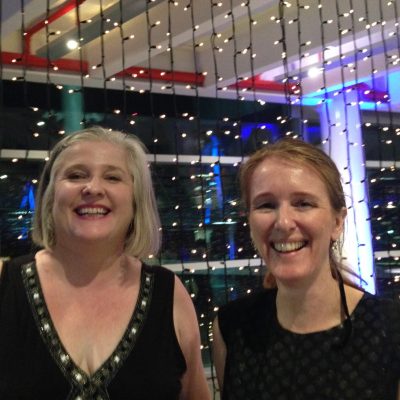 Catherine: Well, again, so many things. I think I’d probably rattle a few off the top of my head and I think some of these are probably really obvious, but they weren’t when I started out. I would consider them learnings. I reckon the first one that comes to mind is that … It’s a personal one, that I think that I’ve discovered that I have got far thicker skin and greater resilience than I actually thought I did. People on social media and I think we’re seeing this more these days, but people on social media will ask everything. They will report all sorts of things.
Catherine: Well, again, so many things. I think I’d probably rattle a few off the top of my head and I think some of these are probably really obvious, but they weren’t when I started out. I would consider them learnings. I reckon the first one that comes to mind is that … It’s a personal one, that I think that I’ve discovered that I have got far thicker skin and greater resilience than I actually thought I did. People on social media and I think we’re seeing this more these days, but people on social media will ask everything. They will report all sorts of things.
Catherine: That’s been a really big learning. Basically nothing is off limits. What’s gone hand-in-hand with that is I didn’t realise how big my internal and external network would become, because in an effort to keep on top of everything that’s going on at Xero, so that I can answer any question that comes my way, even if it’s who drives the Xero Mini in Montreal? I mean, just all sorts of things like that.
Heather: Oh, my goodness. I’ve got visions of people complaining about him turning left too fast or something.
Catherine: I wouldn’t possibly admit to anything like that on a podcast. No, no. But I do know that the Mini will say beep beep if you tweet it, so there you go.
Heather: Very good.
Catherine: I guess another, could be a no brainer, but I always say don’t underestimate the big part that trust and consistency, and follow through plays when it comes to building a loyal following. I’ve learned over the years that even if you don’t always know what to say, you shouldn’t admit that. Where it’s possible and goes along with your brand values, but set expectations. If you say you’re going to follow-up, follow-up. Another kind of weird one is that I’ve mastered the art of saying yes without making people feel dumb, and I’ve also mastered the art of saying no without being really bitchy. There’s a way to agree with a complaint or an issue-
Heather: Acknowledge and recognise the complaint.
Catherine: Yeah. There’s a way that you can agree with what you’re saying without disagreeing or going across your company values and the company’s stance on something. I think a really obvious one is to not be too quick to judge something on face value. There is, as we just talked a little bit about it before, there’s a real touch of magic to read between the lines, to figure out what’s actually being said, and also importantly, who’s saying it. I mean, you learn to recognise the tone, whether somebody, in my case, whether someone’s familiar with Xero or not. I mean, they might not be a customer, they might be something that’s asking the question, they might be a journalist, they might be a competitor, and so you’ve got to figure out how to respond according to all of that.
Catherine: If someone is reporting an issue or a niggle or something like that, I mean, the customer … I mean, the customer’s always right, but the customer’s not necessarily always right about the cause of an issue. But they are right that they are having the issue, so you need to engage on that level. I guess those are probably the main things.
Heather: That’s really insightful and what I’m hearing is just that real acknowledgement of the issue that they’re having, but whether it’s an issue and how it needs to be resolved maybe may take some time. But yeah, that’s I’m sure really helpful for people to listen to. Because when you receive response that is either patronising or they say, “Have you cleared the cache and cookies?” Your mind explodes.
Catherine: Yeah, and that’s not to say that it’s always … I think we’re going to talk about negative stuff a bit further one, but it’s not to say that things aren’t always negative. But there’s still some things can be sarcastic, some thing can be really joyful. I mean, it is all about making sure that you know what the person is saying and yeah.
Heather: You and I both talk globally and work globally. Sometimes things get lost in translation.
Catherine: Exactly.
Heather: And you put something innocent up about… Okay, and this was purely me being completely innocent. I put something up about someone’s pussycat, but they interpreted it to mean something completely different. In different countries, it means different things, apparently.
Catherine: Also, there’s the basic stuff which I guess I didn’t even put this in my mind as learning, because I guess you do just learn to do it, but if you are on a global situation, as we are, knowing where the person is is really helpful. You can find that out from the profile, or how they’ve spelt something. If they say customise with an S and not a Z, then … Because it’s just not really a good look to be saying, “Hey, well, yeah, the BAS can be submitted over here” when the person has come from South Africa. That’s a no brainer, that stuff. But when there’s so much going on, you can’t be so quick to just fire back a response.
Heather: It is a no brainer, but it actually takes you some thought to actually go, “Stop, look, listen. Try and work out what’s going on here before that response happens.” And pull it back if necessary. So, it’s social media, there’s lots of commentary about negative energy happening on social media.
How do you deal with the negative energy on social media?
Catherine: I guess given that I’ve done this for a long time now, I don’t just sit there and cry anymore, which I did. I mean, it’s an outlet, and I did use to just … That’s the only way I could deal with it. I’ve definitely learned that negativity comes with this job. So, I mean, as we talked about before, I make sure to read as many times as necessary, to understand what the person is actually trying to say or ask. If I don’t know where they’re coming from, I just respond and ask. I mean, even if they’re being really negative, and on the face of it they are being really unreasonable, you still have to find a way to ask for clarity.
Catherine: I think a lot of times people are really surprised that there’s a human being at the end of it, and they want to be heard. Even if you don’t have the answer. This has happened a few times. If you end up in a situation that you don’t expect would ever happen if you were having that conversation in real life, that that person’s being particularly rude or insulting, then you have to call it out. I mean, that can be really tricky to do as a brand, but at Xero, we don’t hide away from the fact that we’re human beings. I mean, it’s one of our core and standout values. Most of the time, if don’t right, we can defuse the situation by actually saying, “Hey.”
Catherine: You asked about negative energy, not just negativity. Sometimes I carry it with me. If I can’t shake it off, I just have to … I just go for a walk, talk to a colleague, or my downfall is baking. I just bake. Bread. I can knead it. Knead, knead, knead.
Heather: I did go out this morning and buy my daughter chocolate chips because she’s coming up to exam weeks, so baking is always a good solution for removing stress. Unfortunately, I’m on the other side. I’m the eater who removes the stress, but at least I’ve got a good baker in the house. Look, thank you for sharing that with me. I know me as a solo operator here, dealing with the negative energy on social media, sometimes people don’t recognise how busy you are, or how long something takes to do.
Heather: It’s like they feel that they contact you, and it’s … They should be your primary interest and while they are, it’s like you’ve got a lot going on, and there are only so many hours in the day. And it may take a little while. I’m in a different situation than you are, but for the smaller apps, again, it can take them a little while sometimes potentially to respond. It’s sort of just about being understanding around that. I always think, “Okay, we’re in a café and we’re having a conversation. This is kind of how it should go. This is how we should be treating one another. Don’t shout at me.”
Catherine: Yeah. And sometimes I think silences can be good in a conversation. If somebody needs time to think. But I think sometimes it can come across badly on social media if you don’t respond to somebody that quickly, or it takes them time to find the answer. I’ll often say that, as well. “Look, hey, I’ll get back to you” or whatever. Because you’re right, it is a conversation. That’s setting expectations.
Heather: Yeah, absolutely. You’ve actually given so much great advice already for people listening in. But I do have a two-part question to see if there’s anything else for you to share.
What advice would you have for accounting apps who are app partners who are connected with Xero, and for, separate question, the accountants and bookkeepers who are interacting on social media?
Catherine: Okay. Advice. I was just thinking about this morning, actually, just when I was looking through Twitter, but I think social media is getting a really bad wrap these days. Whether it’s fake news or people run upon each other and spam and advertising, and meanies, and everybody going after the holy grail of going viral. But I think still at its core, it can be a really great connector. If you’re clear that that’s what you want it to be.
Catherine: Maybe people think it requires a lot of time and dedication, and that you don’t even want to go there, because it’s going to suck up your whole life. We’ve all heard the stories about X% of people’s lives are spent on social media, but I mean, it doesn’t have to be that way. I think you can decide on a few things, and make it be part of your routine, as a business. I reckon some of the things that you can think about, and these probably would go along for any business or tool decision, I think. Definitely have a purpose and make a plan for what you want to do. So, why are you jumping on the social media bandwagon if you’re not there already? Or, why do you use, if you think you’re using social media now and it’s not working for you, why are you using it? What’s it going to bring you?
Catherine: I mean if it’s for sales to get more customers. Is it for helping your customers, or people interested in a general topic? That kind of flows into asking yourself or finding out where your audience is, so assuming you don’t want to just post into a vacuum, and you want to get something out of it, whether it’s the exchange of ideas or finding a new customer, where are those people? I mean, if you actually just want to go somewhere to write down your thoughts or maybe that’s a journaling site or a blog, or medium or something like that. If you’re wanting to just put out some more long-form information that you just want people to read.
Catherine: And going along with the time suck thing, I would say think about how you are going to manage it. Once you know the kinds of things that you want to share, is it a daily snippet? A top tip? Is it advice? Is it an article? I mean, where is that stuff? I mean, do you have it already in your head? Is it from something that you’ve been writing over the years and you can just easily harvest it? Or, do you need somebody to gather articles and social media posts of interest for you, so that you’ve got all this stuff ahead of time?
Catherine: Depending on all of those things, it might be that you can just do half an hour a day of a bit of a post, or a bit of research, or maybe if you want real-time conversation, and you want to be interacting with people all day, then you are going to actually have to figure out how to set up your process or your work station, or whatever it is, to have Twitter or whatever it is running all the time so that you can respond all the time.
Catherine: I think another thing, and this is a question that somebody asked me recently, which is how do I live my life as two people? One is the person that’s on social media, and one that’s the person that’s off. I was taken aback a little by that question because I thought I am no different. Who I am online is exactly who I am in person. I guess that could be a decision point. Decide who you’re going to be. I would say be you. It’s worked for me. If you’ve got knowledge to share and questions that you’re going to answer, be real with that.
Catherine: I mean, if you’re going to use your social media for driving sales, work out how that works for you. I mean, it’s probably going to be trial and error, so if you’ve got some prospects out there, are they going to react well to short, catchy sales slogans with steak knives on the side? Or, is it more your personal experience and stories of your customers? That defines the approach that you might take and the person that you’re going to be on there.
Catherine: And then just book in the audience thing. I think you should check-in regularly with who your audience is. I mean, once you’ve found them when you’re first starting out, that could be quite different than who your audience is once you get going, depending on what you’ve been posting. If you’ve got followers on Facebook or Twitter or wherever it is, and it turns out that they’re all your customers, then posting a sales pitch from those accounts is probably not actually going to land very well with them. If people like all the articles that you’re posting, and having conversations about that, then you should do more of that. Yeah, those are probably some good core things.
Heather: And I think that you’ll agree with me that when you said to be you on social media doesn’t mean you have to share everything and you can still be a very private person while being you. For those listening in, someone like myself, I have two children. You never see photos of them. You never see their names on social media. I reference them but they’re completely private and it’s kept off. Be you, but you don’t need to share everything. Don’t photo of your toes on social media. That really freaks me out.
Catherine: Oh no. I did that once, but it was just because I had orange polish for Xerocon. Sorry. I’m going to go check if you’re still following me now.
Heather: No, yeah, I probably am, and I think I put a photo of myself with a pedicure the other day, so what can I talk about?
What technology do you work with?
Catherine: The big thing for us, as is with anybody who’s managing multiple social media accounts, and you might have multiple people managing those accounts, is a platform that allows all the messages across all the platforms to come into one place, so that you don’t miss anything, you don’t have to share passwords and all that kind of stuff. We now, we use Salesforce Social Studio, because we have Salesforce inside Xero already for our ticketing and CRM. That’s what we use.
Catherine: But some platforms that start out as more personal things, like Instagram as we mentioned before, as they start to be used in a business sense, sometimes these third party collation and monitoring tools don’t bring in all of the information that you need from these platforms. So, you still end up doing a bit of work natively. Most of the time I’m in Salesforce Social Studio, but sometimes I need to pop out, to go into Instagram or Facebook. You can access Instagram from Facebook.
Catherine: For me personally, I only use Twitter and Instagram myself, for my own personal accounts. I use them natively because I think even 11 years on, I am still absolutely petrified of posting onto the Xero account, something that was meant for my personal account. I’ve always, I’ve just adopted the … What do you call the invisible wall? Where a tool means that I’m a … Like a monitoring tool, means that I’m in the workspace, and natively over here in a completely different browser, is my personal stuff. So that’s the way that I keep them separate.
Heather: Yeah. It also helps you understand how the audience is receiving the information, because the Facebook platforms, they just change so often. You see people putting stuff out, and it’s like do you realise that image is just not showing up at all properly? Or, it’s come out blurry? Clearly, that image works, because all the platform image sizes are different, so clearly it works over on this platform, but it’s not resonating on that platform.
Catherine: Yep, correct.
Are there any books you think people should read?
Catherine: I saw that you might ask that question. I think you’ve asked other people, but I mean, my first thought is, “Reading? What is this? What is this magical thing you talk about?” It’s on my bucket list, however-
Heather: You’ve got lots of books behind you right now.
Catherine: I know, I know. I saw a thing on Instagram that you’re supposed to put books in the background. I will show you the one that I was going to talk about. Lately, I’ve hunted and found out my favourite baby book, according to my parents, to read to my little friend in Amsterdam over FaceTime. She’s requested this little book a thousand times. It’s a good story about an orange kitten. Orange, of course. And this kitten is frightened of all the animals and insects in the garden because they’re different to him. He learns that he can be friends with them, even though they are not the same. I thought that was really a book for our time.
Heather: Oh, that’s wonderful. What a great idea. Thank you for sharing that, and especially in this time when we are distant and unable to connect with people on a physical level, for a discussion around working on the internet. That’s just a lovely thing to share and hopefully, some other people might grab their own kids’ books and share them with their relatives over social media. I might ring up the kids I’m related to and say, “Do you want aunty Heather to read you something?” So
What’s next for you? What are you thinking about for the future?
Catherine: If only I knew, Heather. If only I knew. I mean, I feel like time and the world around me is speeding by and changing, and I’m just staying, doing the same thing. I mean, I’m really lucky that I love what I do, and I’m not that great with change. So, I don’t actively go out and look for it. If I was to be completely honest and raw, Xero’s a really, really fast-paced company to work for and it feels like everyone is ahead of the curve and they’re inventing the next thing and moving into different roles and looking at technology and business strategy and all of that sort of stuff, years into the future.
Catherine: Sometimes I feel a little rattled, like an old piece of furniture. But I’m not going anywhere. I mean, I do actually really, really believe in our product and the impact that it can have on business owners, and our wide community of customers and partners, and so as long as I can help in whatever way that is, then that’s what I’m going to do.
Heather: Yeah. And look, I think that you’re very important from what you talked about before, in that trust and consistency and however fast the company behaves or impacts the market or tries to be innovative, they need to have an anchor. I say that with much love, but they need to have this anchor that people can reference to, that everyone knows is quite a reliable source then. That I think is very much your extraordinarily and exceptional importance in our community. Both within Xero and beyond Xero, to the cloud accounting community.
Catherine: Thank you.
Heather: So, I’m clearly very much a huge fan of you, Catherine, and delighted that you’ve been able to join me for this podcast to celebrate 100 episodes.
Catherine: Wow.
Heather: Is there anything else you’d like to share with our listeners? And how can they get in touch with you?
Catherine: Nothing else to share, I don’t think. But you can certainly get hold of me. OrangeGirlNZ is me, all over social media. And if you do communicate with Xero on social media and get a response that’s signed off OG, that’s me.
Heather: Yeah. I think that also just in your naming there, is actually two great tips for people who are starting out. Both you and I have the exact same name reference across all social media mediums. You being OrangeGirlNZ, me, HeatherSmithAU. Obviously, I mimicked you with the-
Catherine: Oh, did you?
Heather: I must have done. I think you were doing it before me, so yes, I must have done. So, when someone says to you, “Where are you?” All you need to do is put in that, and you’ll find me wherever you are, and that’s a really smart and yet another useful tip to end with. So, thank you so much for joining me here on the Cloud Stories Podcast, Catherine. It’s just been an absolute delight listening to you, hearing such amazing information that I’m sure the accounting, bookkeeping, and accounting apps community and beyond will benefit from. Oh, and I’ve got one final question for you. You mentioned right at the start you did a music degree.
What’s your favourite musical instrument?
Catherine: I would say cello. I learned to play the piano, I dabbled with the cello but didn’t do so well with it.
Heather: There are a few people in the accounting industry that like a good cello.
Catherine: Yeah, my current favourite is there’s an Elgar cello concerto that I listen to.
Heather: There you go. I’ll need to investigate, explore. You taught me something else, so thank you so much.
Catherine: You’re welcome.

